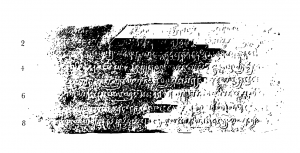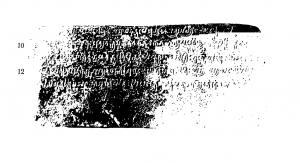

1-2) [The year is 100] (and) 60 (and) 3, (the month of) Āṣāḍha, the day 10 (and) 3—while paramadaivata paramabhaṭṭāraka mahārājādhirāja, the prosperous Budhagupta, is the lord of the earth—(and) while the mahārājaBrahmadatta, the uparika of the Puṇḍravardhana province, selected by His (Majesty’s) feet, is carrying on the administration.
2-3) Hail! From Palāśavṛindaka, the Ashṭakula Board headed by the Mahattara, in conjunction with Viśvāsa, and the husbandmen who are village headmen, after enquiring about (their) health, inform the husbandmen of all the village (of) Caṇḍaka, who are inferior Ryots and are presided over by the Brāhmaṇas, as follows:
3-6) The village headman Nābhaka, has petitioned to us: ‘for the augmentation of (my) parents’ and my own spiritual merit, I am desirous of settling down certain venerable Brāhmaṇas. Deign ye, therefore, to do me the favour of (granting) waste land, excluded from revenue and not yielding (anything), according to the rule of sale customary in the village, after accepting gold from me.’
6-11) “Whereas it has been determined by the record-keeper Patradāsa that ‘this is a case (falling) under the rule of sale and that (land) may be granted to him for the augmentation of the good fortune of the venerable paramabhaṭṭārakamahārāja, in the receipt of two dīnāras from the hands of Nābhaka and on (the same) being credited (to the treasury) by Sthāṇavila and Kapila-śrībhadra, one kulyavāpa of wasteland, (excluded) from revenue (and) not yielding (anything), has been assigned to him, as determined by the determination of that same Patradāsa, (somewhere) on the south, west and east of the boundary of Satya on the north side of Vāyi village. And this should be allotted to Nābhaka after being inspected by the husbandmen under the (Ashṭakula) board headed by Mahattara, after severing it with eight (-cubit) by nine (-cubit) nalas and without detriment to (their) cultivation. (And) the future administrators should guard it looking (upon it) as a religious gift.”
11) And it has been said by the great sages:
Verse 1) He, who takes away land given by himself or by others, having become a worm in excreta, rots with his forefathers.
Verse 2) Land has been granted by many kings, Sagara and others. The fruit (of such grant) belongs to whosoever possesses the earth (at any time).
Verse 3) The giver of land rejoices in heaven for sixty thousand years. He who resumes it and he who assents to (it) may dwell in hell for exactly those (years).